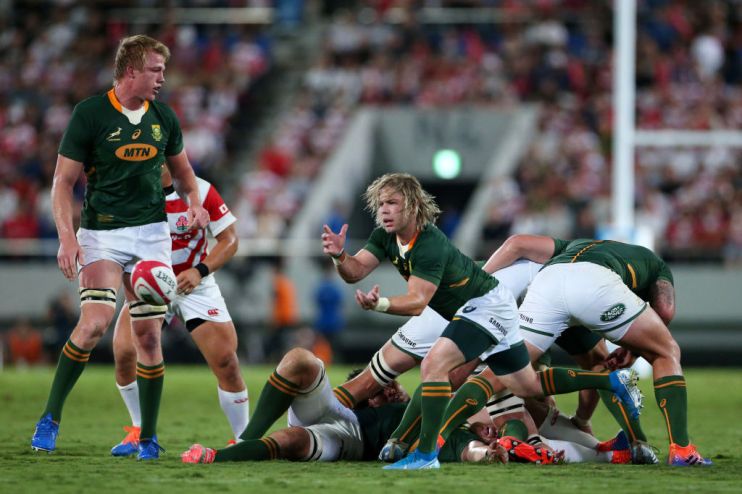South Africa could spring a surprise in World Cup opener against New Zealand

The Rugby World Cup may get under way on Friday when hosts Japan face Russia but the tournament will not fully ignite until a day later when the giants of New Zealand and South Africa collide in Yokohama.
It is an encounter between two of rugby’s great nations, who have collectively won five of the eight World Cups to date.
And while the All Blacks have dominated the international landscape in recent years, there is evidence to suggest the Springboks have come a long way since a 57-0 drubbing at their hands exactly two years ago.
Read more: England will have to go the extra mile to win the World Cup
Fast forward a year to September 2018 and Rassie Erasmus’s side avenged that defeat with their first win in New Zealand for nine years, winning 36-34.
They subsequently lost 32-30 in a rematch a fortnight later but earlier this summer drew 16-16 in Wellington during the Rugby Championship, which South Africa won for the first time since it was renamed following the addition of Argentina in 2012.

If their past three meetings are anything to go by, this fixture will set the World Cup alight.
During Erasmus’s tenure as head coach, the Springboks’ squad has grown in depth and experience without a complete overhaul of personnel.
Hitting their stride
Faf de Klerk, 27, and Handre Pollard, still only 25, have come into their own as a half-back pairing, while their depth at scrum-half is arguably unparalleled.
As well as de Klerk, they have 23-year-old Herschel Jantjies, who came in for the draw with New Zealand and scored a late try to tie the game, as well as Northampton’s Cobus Reinach.
Wing Cheslin Kolbe has also burst onto the scene since joining Toulouse in 2017 and the 25-year-old’s pace and nimble footwork have proven him a lethal attacking threat despite his 5ft 7in and 80kg stature.
Malcolm Marx, also 25, and Pieter-Steph du Toit, 27, have also both established themselves among the best forwards on the planet over the last 24 months as a number of this Springbok side have come into their prime.

The All Blacks are similarly stacked with world-class talent and the likes of Beauden Barrett, Aaron Smith, Brodie Retallick and Sam Whitelock, among a seemingly endless list, are all equally – if not more – impressive compared with their South African counterparts.
Preparing for humidity
It may only be a pool stage game but it can yield clues as to who is best prepared to go the distance.
A possible advantage for South Africa is their decision to play a warm-up game in Japan itself. The Springboks were the first nation to arrive and faced the hosts in Kumagaya 12 days ago.
It allowed them to adjust to the humid 30C conditions, with Erasmus telling his team to “treat it as a wet game” due to the moisture on the ball.
They ceded possession to Japan, using the match as an opportunity to practice their kicking and defensive line in preparation for the All Blacks.
Read more: Eddie Jones takes gamble with squad selection, but how does England’s cap count compare to rivals?
“We almost wanted to play without the ball, just for the first game to see how it goes, as we will never know what it will be like for the game against New Zealand,” Erasmus said.
They won 41-7 with 142 successful tackles, 33 kicks and nine turnovers from just 36 per cent possession.
It was undoubtedly a successful experiment for the Springboks. The All Blacks themselves will of course be a different prospect entirely.